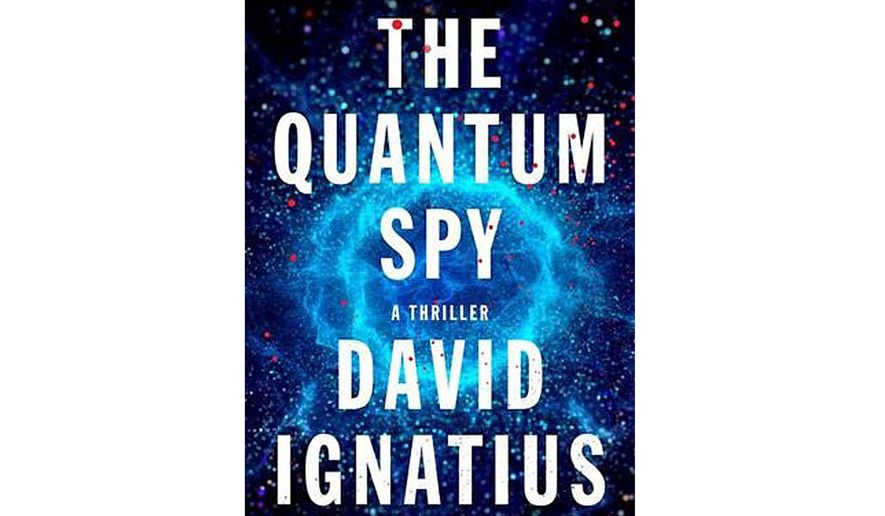OPINION:
Although my knowledge of computers is somewhat limited, I was able to follow the computer science backdrop to “The Quantum Spy,” as author David Ignatius did a fine job of explaining the basic technology involved in quantum computing and why it is vital that the United States builds a quantum computer before China, America’s adversary, builds one.
Quantum computing, Mr. Ignatius’ fictional CIA director explains, is a paradigm shift. It’s like Galileo and Newton. It will change everything. “A Quantum computer would simultaneously explore every answer to a problem, creating a tool of immense, almost infinite computational power,” Mr. Ignatius writes.
The novel opens with John Vandal, the CIA Deputy Director for Operations, paying a visit to Jason Schmidt, an electronics engineer who operated QED, a small, privately-owned computer company in Seattle, Washington. The CIA official was responding to a letter the engineer wrote to his cousin, a CIA officer, that stated he had made a breakthrough in building a quantum computer.
“I’ve solved the puzzle,” the engineer wrote.
“You understand what a big deal this is, Mr. Schmidt? We’re spending billions on quantum research. This is a race. The White House pounds on me every week wanting to know where the Chinese are, and we say relax: It’ll be ten years before anyone builds a machine, probably twenty, and we’re way ahead,” John Vandal said. “And now you say bang, you’ve done it.”
The CIA official explained that the issue was no much that the breakthrough, but rather that someone wanted to steal it. He was referring to what he called a “bell-ringer” in the letter, which was the engineer informing his cousin that he received an offer by a company to buy control of QED. The company, John Vandal told the engineer, was Chinese.
The CIA didn’t want to buy QED, it just wanted to be a customer. The CIA wanted to buy everything QED made.
John Vandal returned to Washington, D.C., to plan his operation against the Chinese intelligence service, the Ministry of State Security, or MSS. Vandal was offended that the MSS was operating in America in such a bold manner.
“The MSS was once thought to be cautious, stealing America’s technology secrets by debriefing Chinese scientists or hacking into computer systems. A thousand grains of sand, one at a time; that was how they were said to collect intelligence,” Mr. Ignatius writes. “But their attempt to capture QED in Seattle had been brazen, and it had nearly succeeded. A greedier owner would have taken the money rather than write to his cousin at the CIA.
John Vandal enlists a Chinese-American CIA case officer named Harris Chang to be his operational point man in the field. He assured Harris Chang that his Chinese ancestry had nothing to do with him getting the assignment, to which the young CIA officer responded, “Give me a break, sir.” The CIA deputy director was silent for a moment and then laughed.
Harris Chang was an Army Ranger lieutenant serving in Iraq when he first met John Vandal. Vandal was impressed with the young and physically fit officer, who told the CIA chief that he hailed from Flagstaff, Arizona, and was an all-state defensive back for the Flagstaff Eagles.
“High school football,” Harris Chang said. “How American is that?”
John Vandal brought Harris Chang into the CIA, and now he sent him to Singapore to “pitch,” aka recruit, a corrupt Chinese scientist with a mistress who was costly to maintain. Harris Chang learned from the Chinese scientist that there is an MSS penetration agent high up inside the CIA. The mole’s code name is “Rukou,” which means “the doorway.”
The race to develop a quantum computer become more complicated with a Chinese mole having access to CIA technological secrets. John Vandal’s operation now includes a mole hunt.
David Ignatius, a veteran journalist and columnist for The Washington Post, infuses information on MSS into the thriller. Much has been written about the Soviet KGB and the Russian successor, the SVR, but little is known about the MSS. Mr. Ignatius incorporates the true life political in-fighting and corruption investigations in the MSS and their military intelligence competitor, the People’s Liberation Army, into his story.
Mr. Ignatius offers two fascinating characters who face off against Vandal and Chang. One is Li Zian, the MSS minister, who is a shady, brilliant and ascetic man with a constant look of Mandarin disdain on his face. The second is Wang Ji, the crafty head of the MSS’ American Operations Division.
Nicknamed “Carlos” due to his many years working in Cuba and South America, he looked like a Chinese Che Guevara, sporting a black leather jacket, beret, wispy moustache and a thin goatee.
“The Quantum Spy” is a well-written, well-researched and suspenseful spy thriller.
• Paul Davis is a writer who covers crime, espionage and terrorism.
• • •
THE QUANTUM SPY
By David Ignatius
Norton, $25.95, 336 pages




Please read our comment policy before commenting.